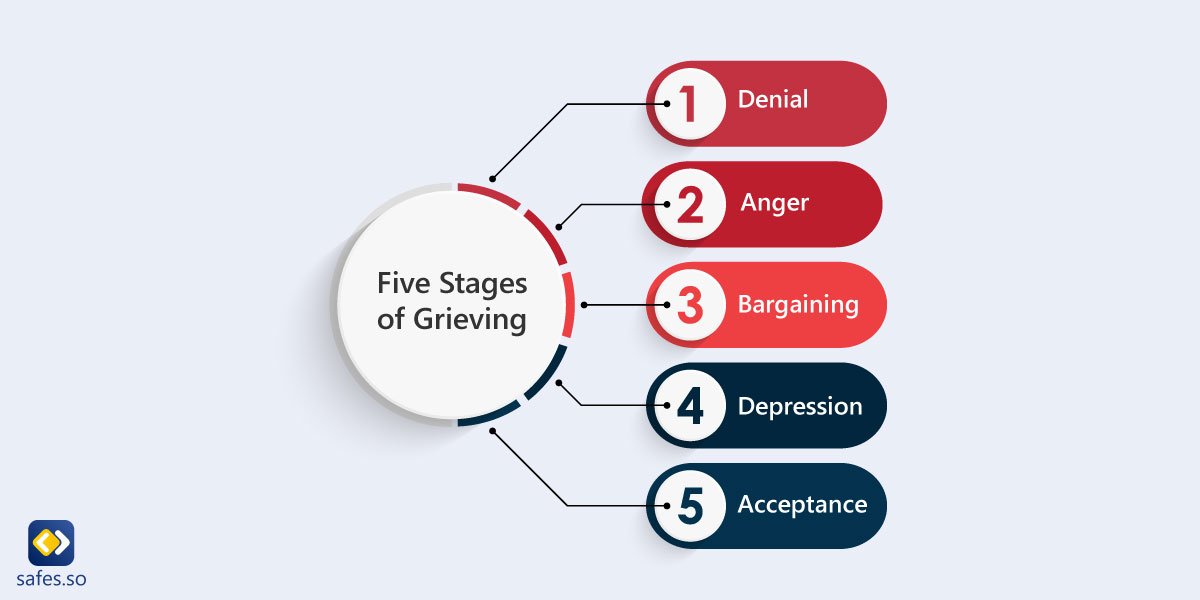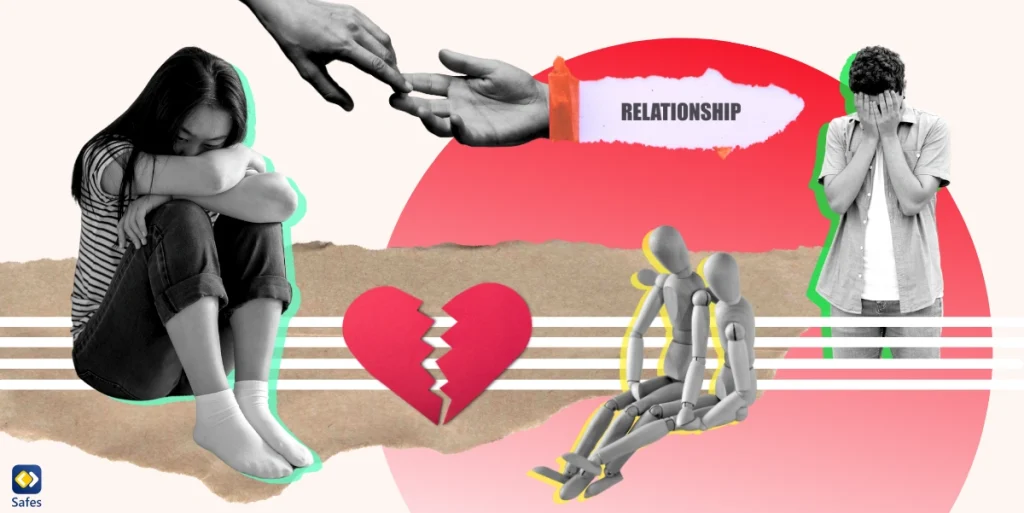Perhaps the most brutal trial in caring for children is how to tell a child their parent died and, after that, helping them deal with their parent’s death. At first, children cannot fully comprehend that their parent is gone from this world. As much as they want their parent back, soon they’ll understand that it is not possible. They grieve but must move forward to keep their loved one’s memory alive in their hearts forever. But how can we make it happen? How to help a child deal with the death of a parent?
Download and Start Your Free Trial of the Safes Parental Control App
Perhaps you’re a parent who recently lost your partner or a close relative or caregiver to a child who has lost their parents and wondering how to help the little one recover. In this blog, I’ll explain the emotional stages a child goes through when losing a parent and how to help them move forward to normal life.
What are the Stages a Child Goes Through When Losing a Parent?
The stages of grief may be different for each individual. But in general, there are typically five stages—denial, anger, bargaining, depression, and acceptance.
The first stage is denial, where the child cannot process the loss and may believe the parent is still alive or coming back. They may feel numb or find it difficult to talk about the loss.
The second stage is anger, where the child may feel resentment towards their parent for leaving them or towards those who are still living. They may feel disconnected or isolated from their peers and family.
The third stage is bargaining, where the child may attempt to bargain with a higher power or try to make deals to bring the parent back. They may also attempt to regain control of their life by making plans or promises.
The fourth stage is depression, which may be accompanied by physical symptoms such as headaches, stomachaches, and emotional outbursts. The child may be overwhelmed with sadness and regret and obsessively think about the deceased parent.
The fifth and final stage is acceptance, where the child is able to begin to move forward with life. They may find solace in the memories of the deceased parent and may eventually be able to find joy in life again.
It is crucial to remember that this process is not linear and that a child may have to revisit earlier stages multiple times before moving on to the next. It is also crucial to provide a supportive environment for the child to help them as they go through the stages of grief.
Below I will give you some tips on how to help a grieving child with the loss of a parent and help them pass through the stages of grieving. Getting professional help from a counsellor or a psychiatrist always helps in each stage.

How to Help a Child Who Is in the Stage of Denial After Losing a Parent?
The best approach to help a child understand why their parent is no longer with them is to be honest and open with them and to provide them with a space to express their feelings.
Start by allowing the child to talk about any confusion, sadness, or anger that they may be feeling. Be patient and listen attentively to the child without judging their feelings or trying to change them.
What to say to a child who lost a parent? Explain the situation in an age-appropriate and straightforward way. Children may not understand the concept of death, so it is essential to be transparent and honest. Answer any questions they may have and encourage them to talk and express their emotions.
Be compassionate and understanding, and let the child know it is okay to cry, laugh, and feel different emotions. You must remind the child that they are still loved and that their parent will always be with them in some way.
How to Help a Child Who Is in the Stage of Anger After Losing a Parent?
When a child is in the stage of anger after losing a parent, you need to give them space to express their grief and anger. Let them talk about the parent and their memories, even if it’s difficult to listen to. Encourage the child to express their feelings creatively, such as through art, music, or writing.
Provide plenty of physical outlets for the child’s anger, such as sports or running. Stress the importance of physical activity to help release negative emotions and build self-esteem.
Surround the child with supportive family and friends. Allow them to grieve in their own way and in their own time. Offer reassurance and comfort. Provide the child with a safe space to talk and to be heard.
Encourage the child to look ahead and focus on their life’s and future’s positive aspects. Help the child to find ways to remember the parent in a healthy and constructive way. Allow the child to participate in activities that help them to remember the parent, such as donating to a charity in the parent’s honour or creating a memorial. This is the best way of supporting a child who has lost a parent.

How to Help a Child Who Is in the Stage of Bargaining After Losing a Parent?
One stage of grief that a child may go through is bargaining. In this stage, the child may attempt to negotiate with the universe to undo the tragedy that has happened. They may make promises such as doing extra chores or studying harder to have their parent back.
As a parent or caretaker, you need to be understanding during this stage. It is essential to acknowledge the child’s feelings of loss and helplessness and to communicate that nothing can be done to undo what has happened.
To help a child during this stage, you need to provide a sense of stability. Encourage the child to talk about their feelings and offer a listening ear. Again, listening without judgment and trying to be understanding are crucial.
Providing the child with activities that may help distract them can also be beneficial. Provide the child with activities that make them feel in control, such as writing in a journal, creating art, or engaging in sports. It can also be helpful to engage in activities together, such as playing board games, going for walks, or cooking.
Providing a supportive and understanding environment can greatly help a child who is bargaining after losing a parent. You need to acknowledge their feelings and provide them with stability, as well as activities to help them cope with their loss.
How to Help a Child Who Is in the Stage of Depression After Losing a Parent?
Helping a child who is dealing with depression after losing a parent requires patience and understanding. Here are some tips that may be helpful:
Acknowledge and validate their feelings: Let the child know that it is okay for them to feel sad and it is also okay to express their emotions. Acknowledge that the situation is difficult and offer emotional support.
Make time for them: Spend time with the child and talk about their feelings. Give them an opportunity to tell you about the situation in their own words and listen with empathy.
Encourage the child to be physically active: Activities like sports, yoga, or martial arts can help them cope with their emotions and give them a healthy outlet for their pain.
Encourage them to talk to a professional: If the child needs additional help, take them to a mental health professional. A therapist or counsellor can provide them with the necessary guidance and support.
Let them know they are loved: Offer reassurances that they are not alone and assure them of your love and support. Let them know they can count on you to help them through this difficult time.

How to Help a Child Who Is in the Stage of Acceptance After Losing a Parent?
The acceptance stage of grief is a time of processing the reality of their parent’s death and understanding the finality of it. During this time, a child may exhibit many different emotions or behaviors, sometimes seemingly contradicting each other. As explained earlier, they are still prone to falling back to the previous stages of grieving. So they still need support.
You can adopt various strategies to help the little one return to normal life and find joy again. Below I’ll give you some tips:
Talk About Their Loved One’s Life Before Death
One key way to help a child cope with their grief is to focus on the happy memories and positive aspects of their parent’s life.
Encourage the child to talk about their parent and ask them to reflect on their favourite memories of them. Doing this can help the child to develop a deeper understanding of who their parent was and why they are so important to them.
It may also be beneficial to provide the child with physical reminders of the parent, such as photographs, special items, or clothing they wore. If there are stories or memories of the parent, share them with the child to help them feel more connected.
Let the Child Reclaim Their Lost Memories
Talk about the parent’s hobbies, favourite foods, family traditions, and even funny stories or anecdotes. Talking about the parent can open up an opportunity for the child to share cherished memories, help them to understand why the parent is no longer around, and provide them with the opportunity to process their grief.
Create a memorial in honor of the parent. This could be a physical item such as a journal, photo album, or art piece that the child can use to reminisce about the parent. It can also be a digital memorial, such as a website or social media page dedicated to the parent.
Finally, it can also be helpful for the child to engage in activities that remind them of the parent. This could include visiting the parent’s favourite places, cooking their favourite recipes, or participating in activities that the parent enjoyed. These activities can be a powerful way for a child to connect with their lost parent and to honor the memories they have.
Concluding How to Help a Child Deal with the Death of a Parent
The death of a parent can be an overwhelming experience for a child, especially if they are too young to understand the concept of death. It is crucial for those in a position to help them provide a supportive environment, be patient and understanding, and offer comfort and reassurance.
When helping a child who has lost a parent, you need to be aware of the five stages of grief they may experience—denial, anger, bargaining, depression, and acceptance. Each stage requires a different approach, and there are many things you can do to help the child cope and eventually move forward with life.
The death of a parent is a difficult thing to go through, but with the proper guidance and support, a child can come to terms with their loss and find joy again. With the help of those around them, a child can make it through the stages of grief and learn to honor the memory of their lost parent.
Related Articles
You may find these blog posts inspiring in helping kids and teenagers deal with the issue of death, especially the death of their loved ones:
- Explaining Death to a Toddler: A Parent’s Guide
- A Grown-Up Guide to Talking to Your Teenager About Death
For more parenting tips, try visiting Safes’s blog. Safes is a parental control app with many features to help parents protect their children from digital distractions and risks. Safes is available to download on Android and iOS devices. To learn more about this program, visit the pages below:
- Windows parental controls
- Macbook parental controls
- Parental controls on Android
- iPhone parental controls
We understand parenting can be challenging, especially in the digital age. Explore Safes with a free trial and discover how it can support you and your family.
Your Child’s Online Safety Starts Here
Every parent today needs a solution to manage screen time and keep their child safe online.
Without the right tools, digital risks and excessive screen time can impact children's well-being. Safes helps parents set healthy boundaries, monitor activity, and protect kids from online dangers—all with an easy-to-use app.
Take control of your child’s digital world. Learn more about Safes or download the app to start your free trial today!



